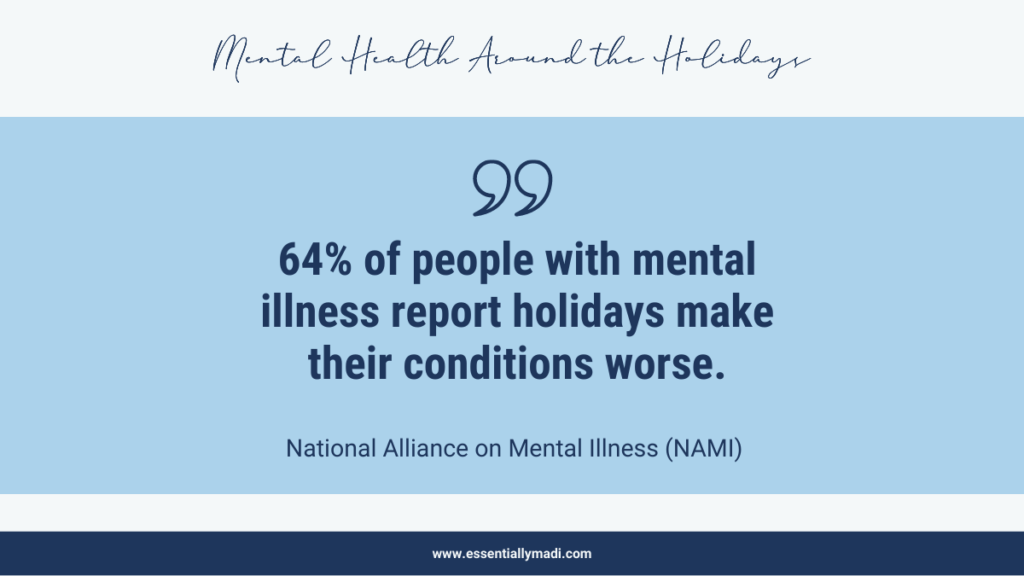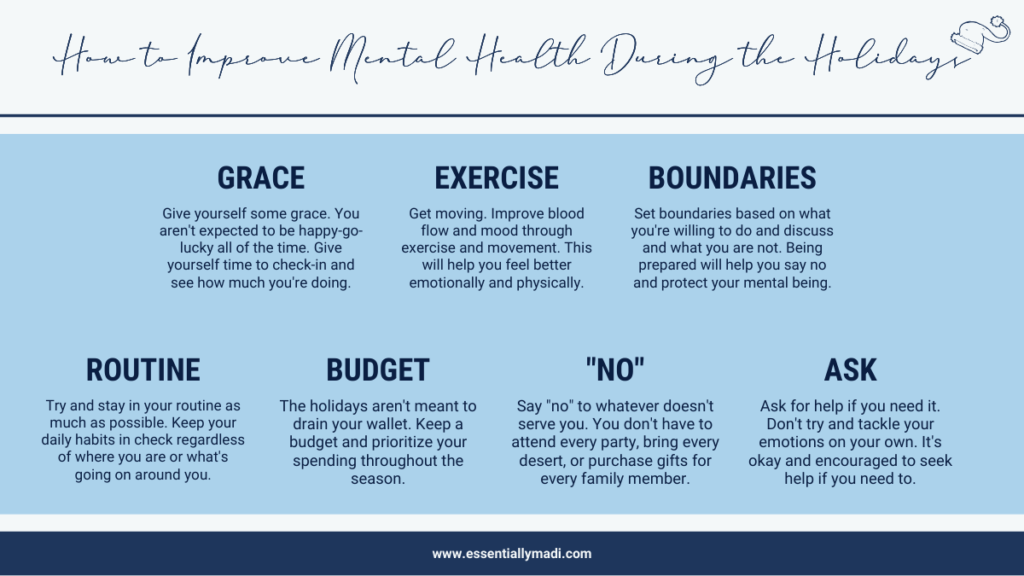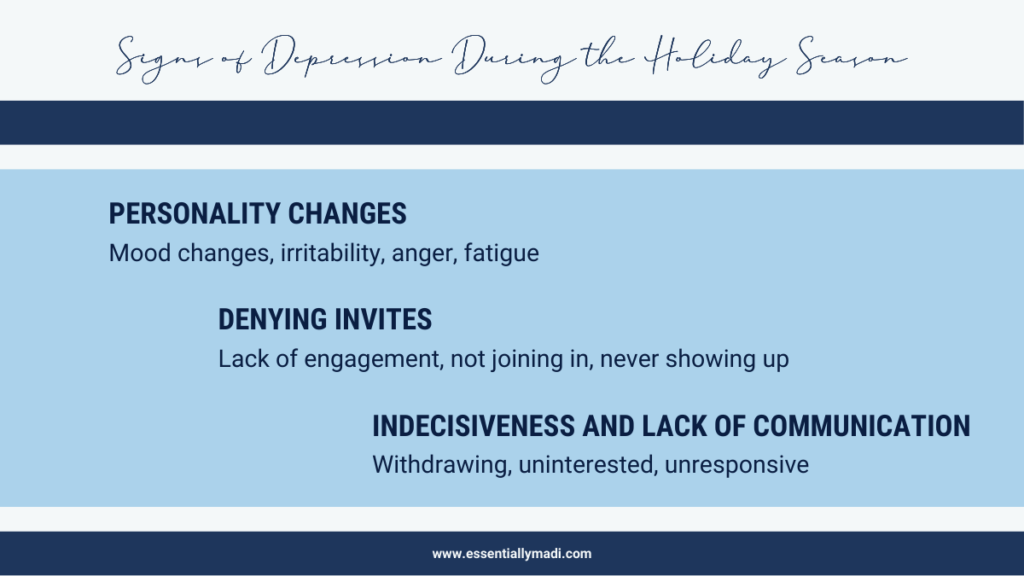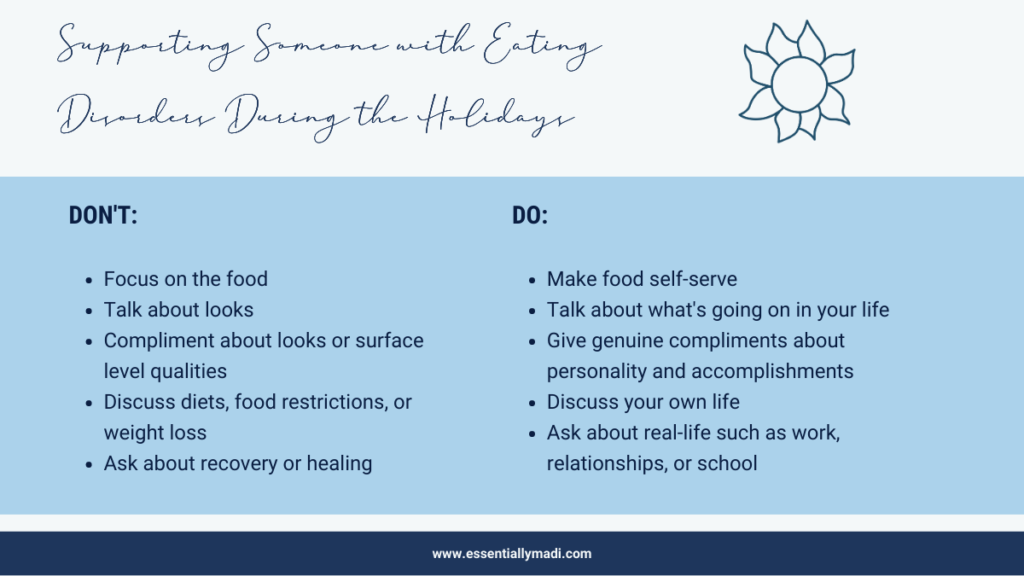contact
Shop
coaching
Learn More →
I help women create confidence through intuitive living and wellness.
Madeline Elizabeth
Oh, the holidays. It’s the best and worst time of the year. Seasons greetings, family get-togethers, parties, and much more. Minds are spinning and events are happening. It’s supposed to be a time where everyone comes together but this often leads to stress, overwhelm, and a plethora of pressure. With winter already being a time when depression peaks, it’s not uncommon to see mental health around the holidays decline. So, how exactly do we cope during these times?

How the Holidays Impact Mental Health
Depression, anxiety, worry, loneliness, etc. may not be the first things that come to mind when you think about the holiday season but these emotions are not uncommon. With all the festivities, it is unlikely for people to seek help during the holidays out of fear of ruining the excitement.
While the holiday season may seem like it’s all fun and joy, it is also a challenging time for many. The winter seasons are already at higher risk for anxiety and depression due to the weather change and lack of sunshine. With that, adding the holidays can make it even worse. The holidays are advertised as happy times filled with friends, family, laughter, and love but not everyone has this. Many people don’t have a family to turn to. Social anxiety sparks, increased consumption of alcohol occurs, and poor self-care are all common effects of the holiday season. Of course, we all want to feel merry and bright during those winter months but it’s also important to understand how mental health can be improved for when those “off” feelings arise.
Ways to Improve Mental Health During the Holidays
Give Yourself Some Grace
Whatever you’re feeling, it’s valid. Maybe it’s overwhelm from family discussions, feelings of loneliness, anxiety from all the chaos, etc. There are a number of reasons that you could feel triggered during the holidays. Remember that just because it’s a “holiday season”, doesn’t mean you have to dance along to jingle bells 24/7. Give yourself some grace and remind yourself to take some time to breathe.
Exercise
Just move. The holidays can be a time of built-up stress and tension as well as not-so-healthy eating which can make you feel not-so-great. Move your body in fun ways to get your blood pumping and energy flowing. It doesn’t have to take up all your time but going for a walk, stretching, or even dancing around is a great want to improve your mental health during the holidays.
Set Boundaries
Worried about the family politics conversation? Anxious about the lectures of when you’re going to get your life together? Nervous of traveling all over to try and appease everyone’s needs? Set boundaries ahead of time for yourself. Think about the conversations that you are not willing to have and prepare kind ways of changing the subject, walking away, or simply requesting that it doesn’t take place. Decide how much you are willing to do and the expectations that you have. This will make it easier to go into situations where you may feel overwhelmed. You will then have a plan to exit prior to panic occurring.

Stay in Routine
Try and stay in your routine as much as possible. This will help alleviate panic and uncertainty about your days. Pivot when needed but try to keep your routine as accessible as possible. It doesn’t have to be exact but keep your habits in check. Exercise, journal, meditate, etc. If there are things that you are used to doing, keep them up even if you’re traveling or experiencing out of the ordinary days filled with parties and festivities.
Budget
Budgeting makes the holidays less stressful. You can better track how much money you have to spend (and on who) based on what your priorities are. If gift-giving is stressing you out, opt-out of it. The holidays are not a requirement to spend money. Read that again. You do not owe anyone anything and if finances are stressing you out, it is absolutely okay to not spend all of your money on gifts. When budgeting, include time off for the holidays (money that you might be making), food spending, and gift-giving (if applicable).
Say “No”
It’s okay to say no, even if you think it’ll bring down the holiday spirits for someone else. Your mental health matters and you do not have to do anything that you don’t want to do. I can’t tell you how many holidays I have spent driving to three separate houses to get it all in. This only leads to heightened anxiety and a lack of quality time with the ones I love most. Saying “no” has been crucial to my mental health around the holidays. No one wants you to be overwhelmed and it’s okay to simply say “no” without an excuse or reason. “No.” is a complete sentence on its own.
Ask for Help
You deserve help. Just because the holidays are here, doesn’t mean your mental health doesn’t matter. It’s not uncommon to be fearful of bringing others down because you ask for help but I’ve noticed that during the holidays, people are more empathic and willing to offer help compared to other times. You just have to give them that chance. Find someone you trust, seek help through therapy, or confide in a friend or family member. Get the help that you deserve so the holidays don’t have to feel like a burden.
Signs to Look For In Loved Ones
Though the holidays seem to be a cheery time for most, it isn’t that way for everyone. It’s important to be aware of how others are feeling during these times, as they may be in a time of struggle, grief, and anxiety. If you aren’t in the mental headspace to help others, don’t. It’s important that you protect your own energy before trying to help others. There are signs that you can look for in your loved ones to help improve their mental health during the holiday season.

Here are a few poor mental health signs to look for in loved ones:
Personality Changes
Winter can already be a challenging time that brings on depression, loneliness, and grief. Recognizing personality changes in friends and family may be a good indicator that their mental health is off and they may need some additional support.
Denying Invites
Denying invitations to get-togethers, festivities, or just 1-on-1 check-ins, may be a sign that someone is struggling during the holiday season, especially if they are one to love a good social gathering. Of course, this is within reason and every denial doesn’t mean that someone is struggling. There are a number of reasons why someone may not show up when invited but it’s important to recognize their reasoning. Some people can’t afford those white elephant gifts, don’t feel confident in being a part of a group setting, or feel overwhelmed with social anxiety. Check-in with your loved ones that may be denying the constant invites because they may be struggling with their mental health during the holidays.
Indecisiveness and Lack of Communication
If someone is usually engaged and clear on what they want and they suddenly become withdrawn, indecisive, and unresponsive, they may feel overwhelmed or have the holiday blues. This isn’t uncommon with so many gatherings and things to think about during the holiday season. It’s important to look for these signs to tell if someone is uninterested or overwhelmed by the things going on around them.
How to Check In With Loved Ones
No one wants to impose on the holiday fun so it’s quite common to not seek help when having poor mental health during the holiday season. Checking in with loved ones may seem like a daunting task when you aren’t sure what’s wrong. When you suspect that something may be “off”, it’s important to address it from a loving place.
Invite, Don’t Pressure
Adding pressure to people joining in on the holiday festivities makes it challenging to open up and discuss internal feelings going on. It’s always good to include loved ones on plans but try not to pressure anyone into anything they don’t want to do.
Acknowledge Their Feelings
Let them know that what they’re feeling is valid and okay. Life is a lot to handle in general. Add in the stress of the holidays, and it can really push someone over the edge. Remind them that they are doing great and it’s okay to struggle. Let them know that you care about them, they matter to you, and that you are always there for them.
Be Mindful of Asking Questions
Ask questions that come from a loving place. Instead of nagging about what could be wrong, offer up ways to help such as bringing them food or offering company. When you suspect that something is wrong, be supportive, and avoid passing judgment on what they could be feeling.
Be Mindful of Eating Disorders and and Insecurities

The holidays often revolve around food and are high-pressure situations when you want to impress family members that you only see every so often. Be mindful when asking questions and engaging in conversation with those who struggle with their weight and/or have a history of feeling insecure. Stay in the present moment and avoid focusing on looks, future plans, or known insecurities.
back
